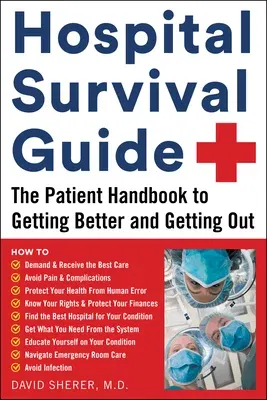WHY YOU SHOULD NEVER HAVE AN OPERATION IN JULY AND OTHER LIFESAVING
ADVICE!
"This book offers practical advice about how to keep yourself free from
harm and error in hospitals, and how to assert yourself in cases such as
getting stuck with a bad roommate or a rude doctor. Includes chapters on
taking children to the hospital and how to be prepared before an
emergency." -- The Wall Street Journal
Hospital Survival Guide: The Patient Handbook to Getting Better and
Getting Out is the essential patient handbook to ensure that you and
your family emerge from hospital visits healthier than before
checking-in and without having to endure excessive stays, pain or
indignities. Includes practical tips, warnings and surprising
information you doctor might not tell you, such as the fact that July,
when the new interns start, is the most dangerous month to have a
procedure done at a teaching hospital; EMLA anesthetic cream can be
requested to be used on children's skin, allowing for less painful I.V.
starts; and washing off all iodine-based antiseptics thoroughly after
surgery can prevent chemical burns. Proven tips for reducing hospital
bills are also presented.
Dr Sherer will teach you how to:
- Find the Best Hospital for Your Condition
- Demand & Receive the Best Care
- Avoid Unnecessary Pain & Complications
- Protect Your Health from Human Error
- Navigate Emergency Room Care
- Educate Yourself on Your Condition & Your Rights
- Protect Your Financial Health & Reduce Your Bills
- Choose Between Bundling Services Versus "Fee for Service" -
Pricing/Pros & Cons
- Work the System to Get What You Need
- Maximize New and Innovative Ways to Use the Internet for
Self-Education
- Deal with the Impact of Pandemic Emergencies, Natural Disasters and
the Opioid Crisis on Your Care
- Learn More about Artificial Intelligence, Robotic surgery and Using
Big Data
- Decide if "Medicare for All" is Feasible and the Social Determinants
on the Allocation of Healthcare
- And Much Much More!
"I recommend this book for everyone, especially people who are
undergoing their first operation in a hospital. Being aware of the
services offered or not offered in the hospital and learning ways to
reduce anxiety can be invaluable throughout one's hospital stay. For
health care providers, the Hospital Survival Guide offers
excellent insight into many of the uncertainties that patients face as
they enter into the unknown world of the hospital. Even though we hear
the alarming statistics every day, the book is a powerful reminder of
all of the mistakes that can be made in the course of care and what we
all can do to reduce the likelihood of experiencing a medical error
ourselves." -- P&T(R) Journal

